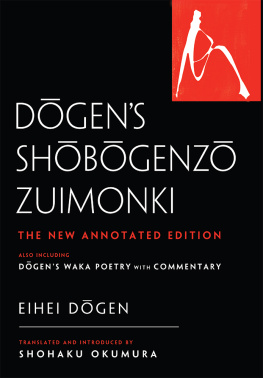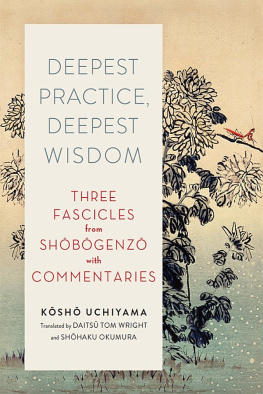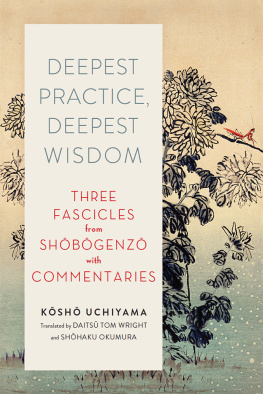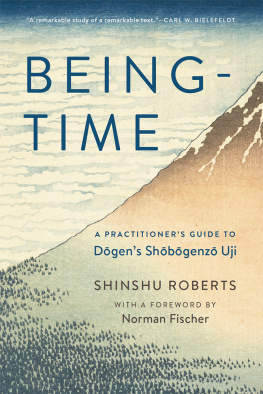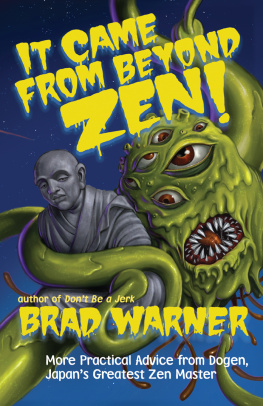Advance Praise for
Dgens Shbgenz Zuimonki
Shhaku Okamuras ongoing work of translation and commentary has for many years shaped my understanding of Dgens teaching. A deeply devoted Zen priest, his careful scholarship is matched by the modesty, straightforwardness, and thoroughness of his interpretations. Shbgenz Zuimonki is two important volumes in one: part 1 is the Zuimonki itself, Dgens informal instructions to his close disciples, freshly translated with lucid comments and notes; and part 2 is the first full translation of Dgens waka poems to include extensive Buddhist commentary, referencing a range of Dgens other writings. I am thrilled and grateful to have both these important new additions to Dgen in English; they will give readers a much fuller appreciation of the range of this great masters expression.Norman Fischer, poet and Zen priest, author of When You Greet Me I Bo w , The Museum of Capitalism , and Selected Poems
I offer profound praise for Dgens Shbgenz Zuimonki and for this wonderful new translation and commentary by Shhaku Okumura Roshi. For many Zen students of my generation these inspiring words were our first extensive experience of the writings of Dgen Zenji. Now we have a fresh translation of this masterpiece, along with insightful commentary, to inspire and guide our practice in the twenty-first century. May Dgens Dharma wheel continue to turn for the welfare of this world.Tenshin Reb Anderson, student of Dgen
This translation is not only Dgens instructions, handwritten by his successor Ejo and transmitted to us. Its as if the reader were there over and over again with the myriad examples and instructions straight from Dgen. With the combination of Dgens poetry, this gives a light and creative quality. I was struck by the simplicity of Okumura-roshis presentation, which is the profundity of Zen. This book will stand and speak as a classicopenly shared and digested for the true Zen student. Jakusho Kwong-roshi, author of No Beginning, No End ; Breath Sweeps Mind ; and Mind Sky
This book is a long overdue new translation of Dgens Shbgenz Zuimonki , his informal Dharma talks, and perhaps his most accessible teachings, as recorded by his disciple Ej. Shhaku Okumura brings extensive Zen practice and scholarship to this translation offering footnotes, biographies, and commentary. An added bonus to this book is the addition of Okumuras evocative translations and commentaries on Dgens waka poems. If you are a Dgen fan, this book is a must for your library. Shinshu Roberts, author of Being-Time: A Practitioners Guide to Dgens Shbgenz Uji
For those who endeavor to negotiate wholeheartedly the Way of Dgen Zen, a new work by the incomparable scholar-practitioner Shhaku Okumura is cause for celebration and gratitude. This superb edition of the Shbgenz Zuimonki , based on the 1644 Chen-ji version of the informal talks that Dgens celebrated disciple Ej recorded after joining Ksh-ji in 1234, consummately expresses the treasures of the true Dharma eye. Dgen counsels us only to speak when we have something to say that is beneficial to both yourself and others, and Okumura and his editor Dju Layton demonstrate that this is a jewel that exceeds all commerce.Tetsuzen Jason M. Wirth, Seattle University
Shhaku Okumura Roshi has produced a tremendously useful and easily understandable translation of this important work about the teachings of Dgen Zenji. Its accessible and practical. In the Shbgenz Zuimonki we get to see a different side of Dgen from the one Dgen presents in his own writings. This is Dgen the way one of his closest students saw him. Dgens student, Ej, asks Dgen the kinds of questions I would like to have asked Dgen. The answers are often surprising and illuminating. Having the Japanese text to refer to is a wonderful addition for those of us nerds who like to check the original language. Brad Warner, author of Hardcore Zen and Letters to a Dead Friend about Zen

Wisdom Publications
199 Elm Street
Somerville, MA 02144 USA
wisdomexperience.org
2022 Shhaku Okumura
All rights reserved.
No part of this book may be reproduced in any form or by any means, electronic or mechanical, including photography, recording, or by any information storage and retrieval system or technologies now known or later developed, without permission in writing from the publisher.
Library of Congress Cataloging-in-Publication Data
Names: Dgen, 12001253 author. | Okumura, Shhaku, 1948 translator. | Dgen, 12001253. Poems. Selections. | Dgen, 12001253. Poems. Selections. English.
Title: Dgens Shbgenz zuimonki: the new annotated translation: Also Including Dgens Waka Poetry with Commentary / Eihei Dgen; translated and Introduced by Shhaku Okumura.
Other titles: Shb genz zuimonki. English
Description: First. | Somerville: Wisdom Publications, 2022. | Includes bibliographical references and index.
Identifiers: LCCN 2021035855 (print) | LCCN 2021035856 (ebook) | ISBN 9781614295730 (hardcover) | ISBN 9781614295976 (ebook)
Subjects: LCSH: Zen Buddhism.
Classification: LCC BQ9449.D654 S5513 2022 (print) | LCC BQ9449.D654 (ebook) | DDC 294.3/927dc23
LC record available at https://lccn.loc.gov/2021035855
LC ebook record available at https://lccn.loc.gov/2021035856
ISBN 978-1-61429-573-0 ebook ISBN 978-1-61429-597-6
26 25 24 23 22 5 4 3 2 1
Cover design by Phil Pascuzzo. Interior design by Tim Holtz.
Publishers Acknowledgment
The publisher gratefully acknowledges the generous help of the Hershey Family Foundation in sponsoring the production of this book.
Part One

Shbgenz Zuimonki
Translation and comments by Shhaku Okumura
Edited by Dju Layton
EDITORS PREFACE

Just as it was to my teacher and his before him, Dgen Zenjis Shbgenz Zuimonki is a personally meaningful text to me. When I first began practicing seriously in my early twenties, I was eager to engage with Dgens work. Being mostly unfamiliar with the voluminous lore of Zen, however, I found the more famous Kana Shbgenz to be almost completely impenetrable. When I expressed my disappointment in this, someone in my sangha at the Missouri Zen Center recommended Shbgenz Zuimonki as a more accessible alternative. Although at first I was skeptical that an approachable text could come from the same author, I was soon surprised at just how down-to-earth it really was. Despite the huge expanse of time, space, and circumstance between me and Dgens assemblyI read it for the first time 773 years after its composition, during my commute on an electric light-rail train en route to a biology lab in a city over ten thousand kilometers (over six thousand miles) from KyotoI often felt that Dgen was speaking directly to me.
When my teacher asked me to edit his new translation of Shbgenz Zuimonki , I was excited that I would have the opportunity to study the text closely. Thinking back on my time as a perplexed newcomer, I made an effort to ensure that this text included many explanatory notes for those not familiar with the cultural and historical context of Dgens time. Several translations of Shbgenz Zuimonki already exist, so we felt that providing a bilingual edition with extensive notes would help give the reader a new way of approaching the text. That being said, readers who prefer to have an uninterrupted reading experience will be able to follow the text without a thorough study of the notes. Compared with Dgens other well-known writings, Shbgenz Zuimonki usually does not require comprehensive knowledge of allusions to other Zen texts or specialized Buddhist philosophy and terminology.

